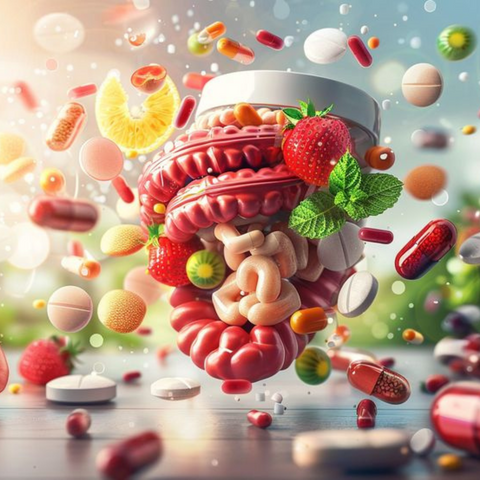
How Our Body Breaks Down Food Into Nutrients!
When we eat, our bodies carry out a complex and well-coordinated process to maintain smooth operation. But have you ever wondered what happens to the food you eat? Your body has an intricate system that works hard to break food down into smaller, usable parts. This system, called digestion, turns your meals into energy, vitamins, and nutrients that power every cell in your body.
The digestive process begins in your mouth and continues all the way to your intestines. Along the way, your body uses muscles, fluids, and tiny structures to ensure every bite is used as efficiently as possible. Let’s break this journey down step by step.
Three Main Stages of the Digestive Process
Food goes through three main steps in the digestive system:
-
Digestion
-
Absorption
-
Elimination
1. Eating (Ingestion)
The process starts when you take a bite. Your teeth crush food into smaller pieces, and saliva softens it, making it easier to swallow. Saliva also contains amylase, an enzyme that begins breaking carbohydrates into sugars. Chewing increases the surface area of food, which allows enzymes to work more effectively.
2. Food Moves Through the Esophagus
Once swallowed, food moves down the esophagus, a muscular tube, into your stomach. Muscles push the food with wave-like motions called peristalsis. This step is primarily about moving food to the stomach, where digestion fully begins.
3. The Stomach
The stomach mixes food with digestive juices made of acid and enzymes. These break proteins into smaller pieces, while the stomach’s walls churn the food into a paste. The acidic environment also destroys harmful bacteria, which ensures safe digestion.
4. Nutrient Absorption in the Small Intestine
After leaving the stomach, food moves into the small intestine, where most digestion and nutrient absorption occur. Two important organs assist here:
-
The pancreas releases enzymes to break down fats, proteins, and carbohydrates.
-
The liver produces bile, which breaks fats into smaller pieces.
The small intestine is lined with tiny finger-like structures called villi that absorb nutrients into the bloodstream.
-
Carbohydrates become simple sugars like glucose.
-
Proteins break down into amino acids.
-
Fats turn into fatty acids and glycerol.
5. Large Intestine: The Body's Waste Processor
What’s left after digestion moves into the large intestine. Water and minerals are absorbed here, and the remaining material turns into solid waste. Helpful bacteria in the large intestine break down leftovers and produce vitamins like vitamin K. The waste is stored in the rectum before leaving the body.
Common Digestive Problems
Some common issues that can affect the digestive system include:
-
Colitis – Inflammation of the bowel
-
Diverticulitis – Swelling of small pouches lining the intestine
-
Gastroenteritis – An infection that causes vomiting and diarrhea
-
Heartburn – When stomach acid moves back into the esophagus
-
Ulcers – Sores that form in the lining of the stomach or duodenum
Good Digestion Matters!
It helps your body get the nutrients it needs to stay healthy and active. It breaks down food and delivers energy and nutrients where they are needed.
-
Eat foods with fiber like fruits, vegetables, and whole grains to avoid constipation.
-
Drink enough water to keep your digestion working smoothly.
-
Chew your food well to make it easier for your stomach and intestines.
-
Eat smaller meals instead of overeating to avoid stomach problems.
-
Add foods like yogurt to help keep your gut healthy.
The human digestive system is a powerful and efficient machine that works tirelessly to convert food into essential nutrients. Your stomach can hold about 1 to 1.5 liters of food, and a meal can take 6-8 hours to digest.
Each nutrient has a unique purpose: carbohydrates energize your brain and muscles, proteins repair and rebuild tissues, and fats provide reserves which help cells function properly.
A balanced diet—about 45-65% carbohydrates, 10-35% proteins, and 20-35% fats—provides everything your body needs each day. Taking care of your digestive health isn’t just about food choices—it’s about giving your body what it needs to stay strong and flourish.
Nutri Intact brings you the best of nature with our rich and exotic selection of nuts, spices, edible oils, and more. We preserve nature's goodness so you can enjoy wholesome food in your everyday meals. The best way to appreciate our quality is to try it for yourself. Enjoy the earthy aroma while cooking, feel the improvements in your gut health, and experience the balance that true soul food provides.
We are proud to be an FSSAI-licensed brand (Lic. No: 11224333002597).




